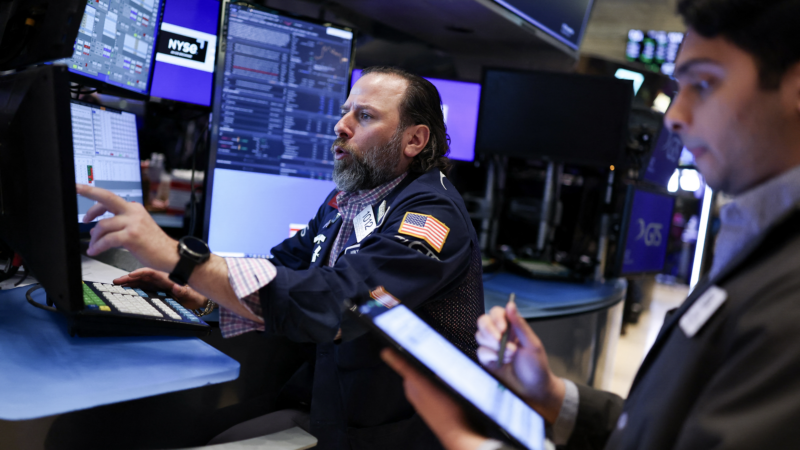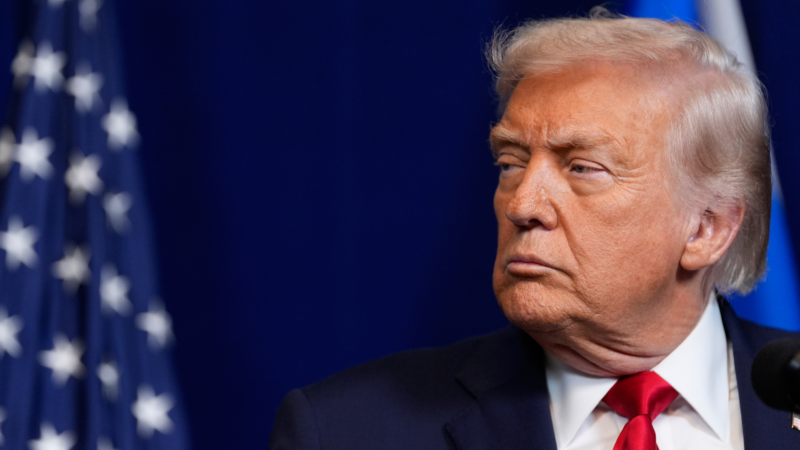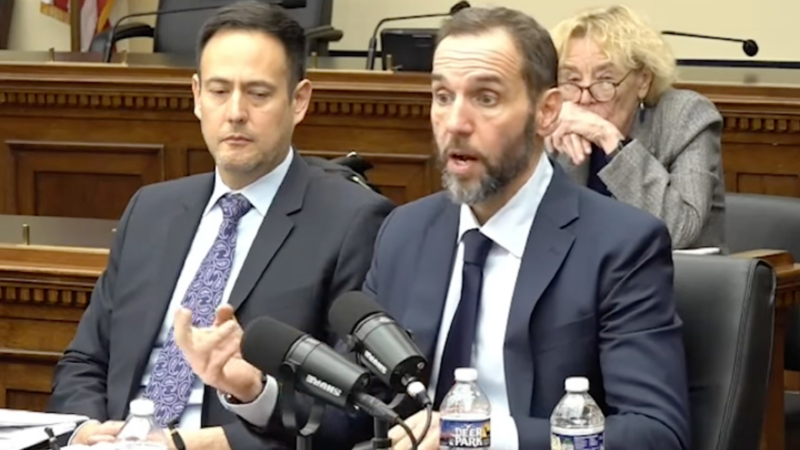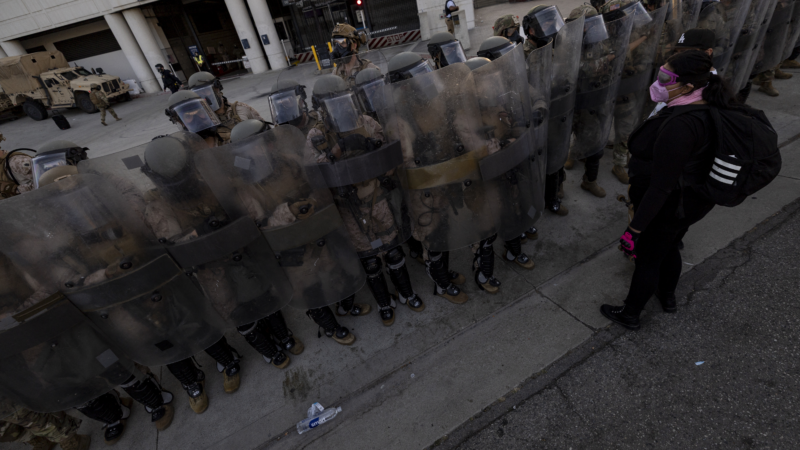U.S. stocks slide again as euphoria over Trump’s tariff pause starts to fade
U.S. stocks fell on Thursday, giving up some of its spectacular gains seen in the previous session as some of the relief after President Trump paused many of his tariffs started to dissipate.
As of mid-morning trading, The Dow Jones Industrial Average was down 2.3% after surging close to 8% on Wednesday. The S&P 500 and the Nasdaq were down more than 2% each after soaring a day earlier.
The declines on Thursday underlie how much uncertainty still remains about what Trump will do about tariffs given that he left others in place, including a 10% tariff on most countries. He also ratcheted up his tariffs on China to 125%.
The uncertainty of what will ultimately happen with tariffs is likely to continue to loom over stock trading. Investors fear tariffs could hit the U.S. and the global economy and raise inflation at home — just when the Federal Reserve appears to be making progress on cooling down prices.
Data earlier showed inflation was lower than expected, rising 2.4% in March from a year ago compared to expectations for a 2.6% increase.
Global market also gain
The losses in Wall Street come after European and Asian stock markets had both soared in line with Wall Street’s gains on Wednesday.
The FTSE 100 in London was up more than 3%, while its peers in Frankfurt and Paris were also gaining strongly on Thursday.
Meanwhile Japan’s Nikkei had closed up 9.1% on Wednesday, while South Korea’s Kospi ended the day 6.6% higher, taking the Seoul index out of bear territory.

In Taiwan, stocks spiked 9.25%, staging a strong comeback after the island’s composite index logged its biggest one-day drop on record earlier this week. Hong Kong’s Hang Seng Index had also gained 2% by the close of trading.
Key indices in China rose only slightly, weighed down by the fact that tariffs imposed on Chinese goods alone are now slated to increase rather than fall.
Investors are still looking to Beijing for fresh retaliatory reaction after President Trump hiked his tariffs on Chinese exports. That increase came hours after Beijing announced Wednesday there would be retaliatory duties of 84% on American goods imported to China.
European reactions and retaliations
Prior to Trump’s U-turn, the policies had caused significant upheaval and wiped trillions of dollars of value from global stock markets. The White House’s actions had also seen U.S. government bond yields soar – concerning investors and economists alike.
“I thought that people were jumping a little bit out of line, they were getting yippy, you know,” Trump said during public remarks in the Oval Office, using a word for jitteriness that is more typically applied to golfers.
In Europe, leaders reacted with relief but some frustration to the decision to reduce tariffs on most EU exports to just 10% for the next 90 days, while higher tariffs of 25% will continue to apply to steel, aluminum and cars.
“Clear, predictable conditions are essential for trade and supply chains to function,” said Ursula von der Leyen, president of the European Commission, which coordinates the EU’s trade policies.
On Wednesday afternoon, the Commission had announced tariffs on certain U.S. exports would start to take effect this month, in response to those earlier 25% tariffs on metals, with further “countermeasures” to be rolled out in May and then December.
But Thursday on social media, von der Leyen wrote that the EU wanted to “give negotiations a chance” in light of Trump’s 90-day suspension, and the Commission would pause the implementation of its own retaliatory tariffs for the same 90-day period.
She warned the EU would continue to identify other, future retaliatory actions, and added that “if negotiations are not satisfactory, our countermeasures will kick in.
Investors in Europe on Wednesday began to reduce their bets on the possibility of rate cuts by the European Central Bank, which would have been one potential response to the risk of a recession caused by the tariffs.
But a French member of the European Central Bank, François Villeroy de Galhau, told French radio that President Trump’s about-face suspension of high tariffs was merely “less bad news” than before, “but there remain two bad ingredients: unpredictability, which is always the enemy of confidence and growth; and protectionism.”
China continues to face severe U.S. trading costs
Analysts appear to disagree on whether Trump’s higher tariffs on China will have a limited impact on the country’s economy. But Goldman Sachs updated its economic forecasts for China’s GDP growth in 2025 because of the negative impacts tariffs will have, lowering them from 4.5% to 4%.
Either way, many investors say they would rather see an end to this explosive trade war between the world’s two largest economies.
But China’s foreign ministry spokesman Lin Jian said on Thursday that China is prepared to continue fighting.
“Let me stress that tariff wars and trade wars have no winners. China does not want to fight them, but will not fear when they come our way,” Lin said at a regularly scheduled press conference.
Speaking from the Oval Office on Wednesday, Trump had repeated his previous assertion that China would eventually negotiate with the U.S.
“President Xi’s a very smart guy and I think we’ll end up making a very good deal,” he said.
The president added he didn’t think the U.S. would need to further increase tariffs to bring Beijing to the bargaining table.
“I can’t imagine it,” he said.
China has signaled it will ultimately be willing to negotiate, but only if the U.S. administration changes its attitude.
“If the U.S. really wants to talk, it should show an attitude of equality, respect and mutual benefit,” Lin, the foreign ministry spokesman, said Thursday.
Asian countries welcome more time to strike deals with the U.S.
Meanwhile, other Asian economies breathed a sigh of relief and welcomed more time to negotiate trade deals and avoid steeper tariffs. Nonetheless, a baseline tariff of 10% will remain in place for all countries during the 90-day suspension of higher tariffs that particularly targeted Asian manufacturing hubs, like Vietnam and Cambodia.
New Delhi wants to move rapidly towards its own updated trade agreement with the Trump administration, which the two sides had agreed earlier this year would take years to finalize.
But Indian authorities have said meanwhile they will start to scrutinize imports more carefully, to ensure low-cost Chinese goods are not dumped in India during the continued spat between the world’s two largest economies.
Ashish Valentine contributed to this report.
Zohran Mamdani sworn in as New York City mayor, capping historic rise
Mayor Zohran Mamdani took the oath of office in New York City after midnight Thursday. The city's first Muslim mayor, a member of the Democratic Socialists of America, has promised to focus on affordability and fairness.
Rising from the ashes, a symbol of hope at the Rose Parade
Survivors of the Eaton and Palisades Fires find healing and community working on a Rose Parade float to honor the lives and communities lost in last year's wildfires.
The history behind the NYC subway station chosen for Mamdani’s swearing-in
The city shut down the station in 1945 on New Year's Eve. Eighty years later, it's a symbolic venue choice for the incoming mayor's private swearing-in ceremony.
U.S. military strikes 5 more alleged drug boats, killing 8
The U.S. military says it struck five alleged drug-smuggling boats over two days. The attacks killed eight people, while others jumped overboard and may have survived. U.S. Southern Command did not reveal where the attacks occurred.
Capitol riot ‘does not happen’ without Trump, Jack Smith told Congress
Former special counsel Jack Smith also described President Trump as the "most culpable and most responsible person" in the criminal conspiracy to overturn the 2020 election results, according to a transcript of Smith's closed-door interview with the House Judiciary Committee.
Trump will drop push for National Guard deployments in Chicago, LA and Portland, Ore.
Courts blocked troops from deploying in Chicago and Portland, Ore., and the Los Angeles deployment effectively ended after a judge blocked it earlier this month.







